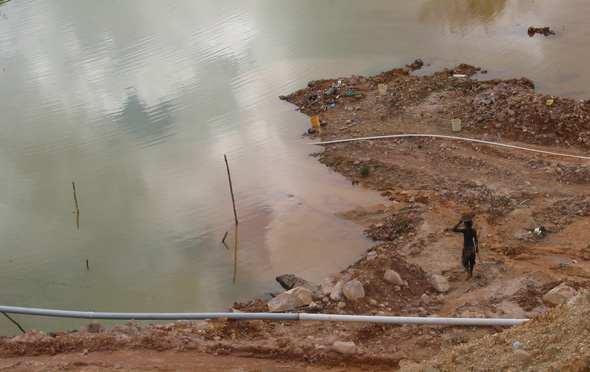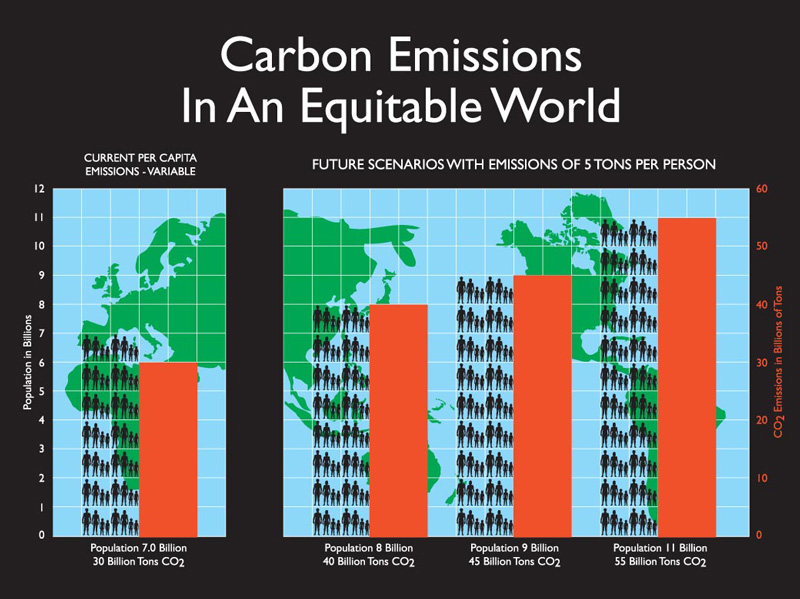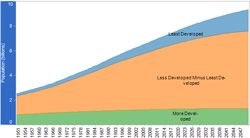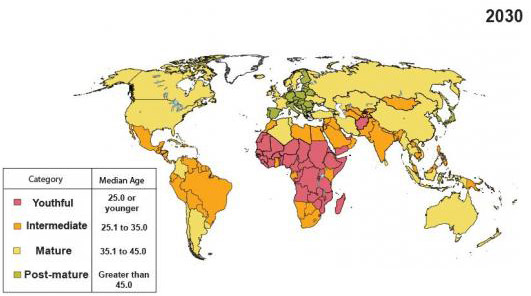-
Artisanal Gold Mining Threatens Riverine Communities in Guyana
›August 14, 2012 // By Keenan Dillard“Sometimes we make sure that we catch enough rainwater to use or we would have to search out the creeks to for water clean enough to drink,” said Guyanese villager Fabian George in a June interview with the United Nations University. The negative effects of a mining boom fueled by surging gold prices have become so widespread in the small South American country, which is about the size of Idaho, that the government has temporarily stopped issuing new gold and diamond mining permits.
The ban, which was announced on July 6 and is still in effect, will last until officials are able to complete a review “of the current management/oversight arrangement of river and tributary mining.” A statement released by the Guyanese Ministry of Natural Resources and Environment explained that “damage caused by increasingly irresponsible mining in Guyana’s rivers and tributaries,” has been a cause of major concern for citizens who depend on them to survive.
Guyana, a former colony of both the Netherlands and the United Kingdom, has a population that is predominantly split between people of African and East Indian descent who were recruited as indentured servants for the tea industry during the 19th century. Amerindians – indigenous Guyanese people – made up just nine percent of the population, as of the most recent census in 2002. A vast majority of Guyanese (71.5 percent) live in rural villages, most of which are located near the coastline. The remaining population resides in the capital, Georgetown, or one of four other urban centers.
While mining is responsible for just nine percent of the country’s GDP, it accounts for almost 60 percent of exports. Gold, bauxite (the precursor to aluminum), and diamonds are extracted and exported to countries including the United States, Canada, and the United Kingdom. In 2011 Guyana produced 363,000 ounces of gold, which represents a 23 percent increase since 2009 and can be attributed “to consistently active mining by small- and medium-scale miners that benefited from the continued increase in gold prices on the international market,” according to the U.S. Geological Survey. The Communities and Small Mining Initiative reports that more than 15 percent of Guyanese citizens economically depend on small-scale mining to support themselves.
Dredging the Jungle
These small-scale operations, also known as artisanal mines, generally employ rudimentary methods to extract and process minerals, as opposed to large scale industrial operations. As of 2011 there were less than 10 industrial-scale companies with any sort of presence in Guyana, while the number of licensed artisanal miners is more than 14,000, according to the government. Although the latter usually consists of just a few workers, they are also incredibly environmentally destructive.
The methods used most by artisanal miners in Guyana begin in one of two ways, according to the Blacksmith Institute: either large water hoses are used to quickly erode a plot of land or barges are used to dredge up sediment from the bottom of a river. Then, they “combine mercury with gold-laden silt to form a hardened amalgam that has picked up most of the gold metal from the silt. The amalgam is later heated with blow torches or over an open flame to evaporate the mercury, leaving small gold pieces.”
The environmental impacts of artisanal mining in Guyana are well-documented and include “drastic increases in the sediment content of river water, increased levels of mercury in river water, creation of artificial sandbars in rivers, deforestation and degradation of land fertility, and mosquito infestation and malaria,” according to a Harvard Human Rights Program study.
A report issued by the Guyanese Ministry of Natural Resources and the Environment last month noted that current environmental problems associated with mining operations include, “widening of the river channel[s] and weakening of soil at river banks resulting in toppling of trees into the river course, blockages and changes to the main river channels resulting in un-navigable channels in the dry seasons.” High levels of turbidity, which is a measure of water clarity, have resulted in the deaths of some fish species that serve as a primary food source for riverine Guyanese communities.
The health of Guyanese rivers and streams is of particular concern to the Amerindians who make up the majority of the population in Guyana’s hinterlands where most artisanal mining occurs. The Harvard Human Rights Program report points out that indigenous people, most of whom survive on subsistence agriculture, are disproportionately affected due to their dependence on waterways for food, transportation, communication, and sanitation.
Adapting to a “Changing World”
Over the past few months the environmental, social, and health effects caused by gold mining in Guyana has become serious enough to warrant a temporary governmental halt to the issuance of any new licenses. In the meantime, scientists employed by the Guyana Geology and Mines Commission are attempting to find a viable alternative to using mercury – the most damaging practice of artisanal miners – amid increasing pressure from the international community. In addition to polluting waterways and contaminating fish, mercury releases highly toxic vapors when it is burned away from gold, which can damage both internal organs and unborn children.
Damages from the run-away mining sector aren’t limited to the environment. The Amerindian Peoples’ Association in Guyana blames increases in prostitution, drug trafficking, and human trafficking on the country’s gold rush. According to the UN, “interior police investigated nearly 50 bush murders last year, about 40 more than normal, many from fights over gold and women or from drunken rum sprees by miners on time off.” Unlicensed mines and illegal aliens who cross the border from Brazil, compounded with a large smuggling operation that bypasses Guyanese gold taxes via Suriname, have left the government struggling to “enforce regulations, hire enough trained jungle mines inspectors, qualified geologists and other personnel to keep pace, and generally maintain order,” according to the UN.
On July 28, the Guyana Geology and Mines Commission issued a statement regarding the future of mining, and stressed the need to create a “holistic plan to have the industry adapt to a changing world.” For now it seems that complaints from Amerindian groups and other Guyanese citizens are the driving force in affecting change within the country, but opposition from interest groups such as the Guyana Gold and Diamond Miners Association is intense. The government has acknowledged international pressure too as a factor in its decision to suspend new permits and recently began a partnership with the United Nations Development Programme to develop a natural resource management plan. It remains to be seen exactly what measures will be taken to address the serious problems facing the Guyanese people as a result of gold mining, but given the strong economic imperative for artisanal miners and the severity of environmental and human health effects, action must be taken soon.
Keenan Dillard is a cadet at the United States Military Academy at West Point and an intern with the Woodrow Wilson Center’s Environmental Change and Security Program.
Sources: Amerindian Peoples Association, Blacksmith Institute, Bureau of Statistics (Guyana), Center for International Forestry Research, Central Intelligence Agency, Communities and Small-Scale Mining, The Daily Herald, Demerara Waves, Environmental Protection Agency, Guyana News and Information, Harvard Law School, Inter Press Service, Ministry of Natural Resources and the Environment (Guyana), National Communications Network (Guyana), Stabroek News, United Nations, U.S. Geological Survey, USAID.
Photo Credit: “Gold Mine (Mahdia, Guyana),” courtesy of flickr user caribbeanfreephoto (Georgia Popplewell). -
Population and Sustainability in an Unequal World
›August 13, 2012 // By Laurie MazurJune’s Rio + 20 Conference on Sustainable Development left environmentalists little to cheer about. Kumi Naidoo, executive director of Greenpeace International, called the meeting “a failure of epic proportions.” And Washington Post reporter Juliet Eilperin said the conference “may produce one lasting legacy: convincing people it’s not worth holding global summits.”
-
PRB’s 2012 World Population Data Sheet
› “The most rapid population growth in many ways [occurs in] the countries that can least afford it,” said Carl Haub in a webinar on July 19 to launch the Population Reference Bureau’s (PRB) 50th annual World Population Data Sheet. This year, the report explores aging populations in more developed countries, rapid population growth in less developed countries, and the increased global prevalence of non-communicable diseases in an interactive map, which concisely illustrates global trends. PRB estimates that the world’s population is 7,057,075,000 as of mid-2012; the global population crossed the seven billion threshold in October 2011.
“The most rapid population growth in many ways [occurs in] the countries that can least afford it,” said Carl Haub in a webinar on July 19 to launch the Population Reference Bureau’s (PRB) 50th annual World Population Data Sheet. This year, the report explores aging populations in more developed countries, rapid population growth in less developed countries, and the increased global prevalence of non-communicable diseases in an interactive map, which concisely illustrates global trends. PRB estimates that the world’s population is 7,057,075,000 as of mid-2012; the global population crossed the seven billion threshold in October 2011.
“The most rapid population growth in many ways [occurs in] the countries that can least afford it,” said Carl Haub in a webinar on July 19 to launch the Population Reference Bureau’s (PRB) 50th annual World Population Data Sheet. This year, the report explores aging populations in more developed countries, rapid population growth in less developed countries, and the increased global prevalence of non-communicable diseases in an interactive map, which concisely illustrates global trends. PRB estimates that the world’s population is 7,057,075,000 as of mid-2012; the global population crossed the seven billion threshold in October 2011.
“The most rapid population growth in many ways [occurs in] the countries that can least afford it,” said Carl Haub in a webinar on July 19 to launch the Population Reference Bureau’s (PRB) 50th annual World Population Data Sheet. This year, the report explores aging populations in more developed countries, rapid population growth in less developed countries, and the increased global prevalence of non-communicable diseases in an interactive map, which concisely illustrates global trends. PRB estimates that the world’s population is 7,057,075,000 as of mid-2012; the global population crossed the seven billion threshold in October 2011.
Aging Europe and East Asia
Haub explained that population growth in Europe has been declining since the 1970s and is more or less a “pre-programmed destiny” for these countries. People of child-bearing ages make up a smaller percent of the population in many more developed countries, so unless there is an “enormous increase” in total fertility rates, these populations will continue to decline for the foreseeable future.
Haub noted that these aging populations are unprecedented. In Germany and Italy, for example, 21 percent are over the age of 65; many other European countries have similar figures, as do other developed countries like Japan and South Korea. PRB expects these percentages to increase throughout the next century and for European countries to struggle to support greater numbers of retirees.
Many such states have already found it difficult to raise the retirement age, even though medical advances allow people to work until later ages. PRB projects that in Japan, 42 percent of their population will be over the age of 60 in 2050; if such a large percentage of the population is no longer in the labor force, it will be difficult for to find the resources to support them.
The report shows that the United States, on the other hand, is still experiencing modest population growth. The higher birthrate is in part due to immigration, as recent immigrants to the United States tend to have more children. Haub noted that European states have been reluctant to accept greater numbers of migrants to try to reverse their declining population.
Youthful Developing Countries
While the demographic destiny of aging countries is somewhat determined, the future for less developed countries is more uncertain. Many countries in sub-Saharan Africa, the Middle East, and South Asia have large and growing youth populations, and how many children these “future parents” will have is uncertain. That uncertainty is underscored by the variety of scenarios for future population growth. The UN has four variants – high, medium, low, and constant fertility – which vary considerably in their projections for future populations, and PRB’s global projections for 2050 are some 600 million people more than the commonly-used medium variant UN projection.
Rapid growth in the least developed countries is hardly a new phenomenon, but PRB breaks down the numbers to an impressive degree. The 2012 Data Sheet provides updated net migration rates, projected population as a multiple of today’s, infant mortality rates, rate of natural increase, and other basic statistics. PRB also provides population pyramids from the wealthiest and poorest quintiles of the population of Malawi, as an example of the utility of desegregating data to better allocate resources to the underserved. They found that while birthrates have begun to decline for the wealthiest one-fifth of Malawians, the poorest citizens still have a total fertility rate of over seven children per woman.
Measuring Health Systems
Devastating infectious diseases – malaria, tuberculosis, and HIV/AIDS – have long been entrenched in some of the least developed and most rapidly growing parts of the world. But this year, PRB began to assess health on a broader level by tracking deaths attributed to non-communicable diseases as well. Diseases like cardiovascular disease, diabetes, respiratory illness, and cancer are leading causes of death in developed countries, but they have also increased in prevalence in developing countries at an alarming rate.
PRB is not the only organization to take note of the change in disease predominance. The World Health Organization has issued guidelines targeting four factors which increase the risk of these illnesses: tobacco use, alcohol abuse, poor diet/obesity, and physical inactivity. The UN also called a special session last September to discuss non-communicable diseases. President of PRB Wendy Baldwin noted that the last such discussion on a health issue was 10 years ago about HIV/AIDS.
Baldwin also pointed out that non-communicable diseases can increase the burden on the health systems of developing countries even more so than in developed states. She reported that in south Asia, for example, people have heart attacks on average six years earlier than people in developed countries, meaning more families lose their primary breadwinners.
The risk factors for these non-communicable diseases are difficult to target, especially with increasing urbanization in developing countries. But in a video accompanying the report, Baldwin mentioned that raising the price of cigarettes is an effective way to reduce tobacco consumption, especially for youth. Some countries have also made progress in increasing physical activity through sports programs and making urban areas safer for pedestrians. “The low and middle income countries have a real opportunity to take really positive steps to confront that rise in non-communicable diseases and to address the risk factors that drive them,” she said.
The Data Sheet Over Time
The World Population Data Sheet has long been a vital resource for those in the population, health, and environment fields and has grown to include far more data than its first iteration in 1962. At first, the sheet had only four indicators: a population estimate for the year, annual rate of increase, crude birth rate, and crude death rate. Over time, PRB began measuring a greater number of key figures like infant mortality and life expectancy at birth. Population projections, a staple of the current version, were not added until 1978, perhaps in response to the inception of the United Nations World Population Projections in 1974.
Over the past five decades, the data sheet has been witness to some major shifts in global population trends. While PRB discourages researchers from comparing past data to current figures because the measures and methods of gathering information have likely changed over time, it is still possible to see the rise of importance in several trends based on the indicators PRB chose to focus on each year. For example, extremely young populations have been found to have profound effects on a country’s stability and prosperity, as have aging populations. The 1966 data sheet was the first to measure the percentage of the population under the age of 15, and it didn’t become a consistent data point until 1977.
The number of people living in cities in the developing world surpassed those in the developed in 1970, according to the UN, and in 1972, PRB began tracking the percentage of populations living in urban areas. HIV/AIDS indicators were added in 2000, as global awareness and a commitment to fighting the disease was rising.
PRB’s demonstrated commitment to continually adding more data and refining existing projections makes the data sheet is a valuable resource to those studying the problems of today and the future. Fifty years on, the amount of information collected is staggering. The data sheet provides a glimpse at not just how many people there are in the world, but also where and how they live.
For more information, take a look at the full data sheet!
Sources: Population Reference Bureau, UN Population Division.
Image Credit: PRB; Video: Noncommunicable Diseases and Youth in Developing Countries. -
Iran’s Surprising and Shortsighted Shift on Family Planning
›August 8, 2012 // By Elizabeth Leahy Madsen
In late July, Iran’s government announced that it would no longer fund family planning programs, a dramatic reversal following 20 years of support. The change is especially abrupt for a country that has been lauded as a family planning success story, with thorough rural health services and an educated female population contributing to one of the swiftest demographic transitions in history.
-
PSA: We’re Hiring Two Program Assistants!
›August 8, 2012 // By Wilson Center StaffECSP is seeking two Program Assistants to support event planning and outreach/communications on environmental, population, health, security, and development issues. Come help bring together scholars, policymakers, the media, and practitioners through events, research, publications, multimedia content, and our award-winning blog, New Security Beat. -
Three UN Millennium Development Targets Reached and a Review of the Human Drivers of Climate Change
›“It is plausible that key transitions in human evolutionary history have been driven in large part by climate change,” write Eugene A. Rosa and Thomas Dietz in “Human Drivers of National Greenhouse-Gas Emissions,” a literature review published by Nature Climate Change. “Changes in climate will doubtless be a key force in the future evolution of social systems, including all aspects of social, economic, and political life, while impinging on the health and well-being of the individuals who populate them.” Rosa and Dietz cite numerous studies to argue that nearly every facet of society will be affected by climate change. “The critical point,” they write, “is that population, affluence, technology, and all other drivers act not alone or additively but in a multiplicative fashion.” For example, rapid population growth can lead to an increase in urbanization, which generates “substantial demand for goods and services that can induce emissions in distant places.” They conclude that huge changes must be made in technology and consumption in order to combat the effects of climate change that are being caused by a growing population and an increasingly affluent world.
The United Nations’ 2012 Millennium Development Goals Report, released last month in New York City, announces that three of the eight major human development goals have been reached ahead of their 2015 targets. The Millennium Development Goals, set at a conference in 2000, were established to “uphold the principles of human dignity, equality, and equity at a global level.” The 2012 report indicates that the number of people living in extreme poverty has been halved since 1990; the proportion of people in the world without sustainable access to safe drinking water has also been halved; and more than 200 million slum dwellers have “gained access to either improved water sources, improved sanitation facilities, or durable or less crowded housing.” At the report launch, UN Secretary-General Ban Ki-moon noted that “these results represent a tremendous reduction in human suffering and are a clear validation of the approach embodied in the MDGs, but they are not a reason to relax.” Goals that have yet to be achieved include universal primary education; gender equality; reduced child mortality and improved maternal health; reducing rates of diseases such as HIV and malaria; and creating a global partnership for development.
Keenan Dillard is a cadet at the United States Military Academy at West Point and an intern with the Woodrow Wilson Center’s Environmental Change and Security Program. -
Is This What Climate Change Feels Like? Geoff Dabelko on ‘CONTEXT’
›“I think that the conditions that we’re experience now are ones that track with what we expect to see more of; so dry places getting drier, wet places getting wetter, and more extremes in terms of variability of the weather,” said ECSP Director Geoff Dabelko in the latest installment of CONTEXT, a weekly Wilson Center interview series. While it’s difficult to link the current drought – or any one weather or climate event – directly to man-made climate change, Dabelko said that “the warming trends that we’re seeing and anticipating with climate change suggests that this is a preview of what may be to come.”
-
A Roundup of the ‘Global Trends 2030’ Series on Population Aging
›
The National Intelligence Council is trying something new for this year’s Global Trends report: keeping a blog. So far, there have been postings from analysts and contributors on everything from migration and urbanization to international banking and precision strike capabilities, but over the past week, one of the most extensive series yet went up on demography. Though youth bulge theories have often dominated population-related security discussions, 11 posts highlight the newest and least understood of all demographic conditions: advanced population aging.
In parts of the world, mainly Europe and several countries in East Asia, populations are set to become “extremely mature” because of sustained declines in average fertility to very low levels and steady increases in lifespan. Demographers measure maturity by a population’s median age – the age of the person for whom precisely half of the population is younger and half older. Japan and Germany currently have the most mature populations; both are reported to have a median age slightly over 45 years. By 2030, UN Population Division and U.S. Census Bureau projections suggest that there may be between 19 and 29 countries that pass this benchmark. In Japan, the median age is projected to be 51.
If 5 out of 10 people in a country over 50 years old sounds unprecedented, that’s because it is. In this series, titled “Population Aging to 2030,” a group of political demographers, economic demographers, political scientists, and historians discuss the implications of this never-before-experienced set of age structures.
In his introductory essay, “Population Aging: A Demographic and Geographic Overview” (cross-posted here on New Security Beat), Richard Cincotta outlines the upcoming demographic trend, identifying the particulars of these novel age structures and indicating the regions that are expected to mature into economically and politically advantageous and disadvantageous demographic profiles.
In “Population Aging – More Security or Less?,” Jack Goldstone examines the effects on the U.S. military of a maturing developed world. With the United States and their traditional allies having proportionally fewer young people, will this impact limit their ability to put “boots on the ground?” Can new partnerships be developed in order to make up for this shortfall in man power?
In “China: the Problem of Premature Aging,” Richard Jackson focuses on China’s unique set of aging issues. Due to strict immigration laws and the one-child policy, China is experiencing the most rapid aging of the major powers. The favorable age structure which has enabled huge economic growth will soon shift to being a major burden on a relatively smaller working-age population, having potential political and societal consequences beyond that.
“The Sun Has Yet to Set on China” provides a different interpretation of the challenges China faces. Jennifer Dabbs Sciubba argues that although there will be changes in age structure, the problems may be overstated and the United States may still face a challenge to its status as sole global superpower.
In “Population Aging and the Welfare State in Europe,” Ronald Lee and Andrew Mason emphasize the stresses aging will exert on the extensive social welfare programs of many European states. The combination of longer life expectancy and declining fertility rates has led to a large and increasing funding gap in the welfare system, leaving questions as to the future viability of these programs.
In “Population Aging and the Future of NATO,” Mark Haas foresees that the welfare funding gap could have far-reaching international security consequences. With European governments diverting more and more resources away from military spending to fund welfare programs, the current U.S. irritation with NATO is likely to continue, as European allies “free ride” on the back of U.S. military supremacy in order to cut their defense budgets.
In “The Beginning of History: Advanced Aging and the Liberalness of Democracies,” Richard Cincotta examines the future of the liberal democratic political systems across aging countries. With increasing pressure on resources and a large disparity likely between the native born and migrant populations, it may become challenging for these states to remain liberal and democratic.
For Toshi Yoshihara, author of “The Strategic Implications of Japan’s Demographic Decline,” the aging process will pose a question of priorities for the leaders of Japan. The decreasing number of personnel available to the military, the effects of which were highlighted by the recent tsunami, will force a strategic decision between a defense force that is prepared primarily to address immediate and local security threats or one that is trained primarily for broader humanitarian interests.
“A Demographic Sketch of a Reunified Korea” provides interesting insights into the hypothetical demography of a single, unified Korea. Putting aside the two very distinct social paths that evolved during the past 60 year, Elizabeth Hervey Stephen uses demographic projections to envisage the challenges and opportunities that could arise from reunification.
David Coleman points to immigration as a possibly-mitigating force to aging in the developed world. In “The Impact of Immigration on the Populations of the Developed World and Their Ethnic Composition,” Coleman concludes that the developed world is likely to become “super diverse” by 2030. But this trend can be volatile. International migration is subject to many political and economic factors, bringing into question whether the developed world can rely on migration to supplement their native growth rates.
In “The Ethnic Future of Western Europe to 2030,” which wraps up the series, Eric Kaufmann examines the ethnic make-up of Western Europe in the coming decades. While the size of ethnic minority populations may be smaller than in the United States, the speed of growth in these minorities is likely to be much more rapid in Western Europe. This unprecedented increase in migrant populations could exacerbate ethnic social tensions, particularly in urban areas.
The broad nature of these essays suggests that advanced population aging will emerge within the context of many types of policy debates in the coming decades. While these 11 brief essays only scratch the surface of their respective areas of research, they provide a broad introduction to the politics of advanced population aging.
Jonathan Potton is a student at the University of Aberdeen and currently interning at the Stimson Center for demographer Richard Cincotta.
Sources: UN Population Division, U.S. Census Bureau.
Image Credit: Courtesy of Richard Cincotta. Data from U.S. Census Bureau’s international database.
 A Publication of the Stimson Center.
A Publication of the Stimson Center.



 “The most rapid population growth in many ways [occurs in] the countries that can least afford it,” said Carl Haub in a webinar on July 19 to launch the Population Reference Bureau’s (PRB) 50th annual
“The most rapid population growth in many ways [occurs in] the countries that can least afford it,” said Carl Haub in a webinar on July 19 to launch the Population Reference Bureau’s (PRB) 50th annual 





